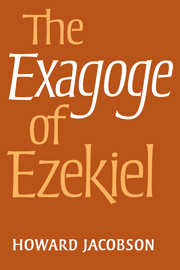Summary
The Exagoge
Ezekiel the tragedian is a writer of major importance. The fragments of his Exagoge represent the most extensive remains of any Hellenistic tragedy – or indeed tragedian. Consequently, Ezekiel is our most significant source of evidence for Hellenistic tragedy, though it is not possible to determine whether the Exagoge is representative of Hellenistic tragedy or in what particular ways it may be. Further, for the student of Jewish literary history and thought Ezekiel is one of our most important sources for the Hellenistic period in the diaspora and may even be of importance for students of the New Testament and early Christianity. The Exagoge is the solitary surviving example of Jewish drama in Greek and the largest extant example of ancient Greco-Jewish poetry. Yet, Ezekiel has never been given his due by scholars of Judaism and early Christianity and even less by Classicists. ‘Comprehensive’ works often skim over or completely ignore Ezekiel. Thus, for instance, both the first edition of A. Körte's fundamental Die Hellenistische Dichtung (Leipzig 1925) and its revision by P. Händel (Stuttgart 1960) fail to mention Ezekiel. A. E. Haigh's The Tragic Drama of the Greeks (Oxford 1925) lists the Greek tragic poets, including tragedians not from Greece (pp. 463–72), but ignores Ezekiel. P. Wendland, in his famous study Die hellenistischrömische Kulturin ihren Beziehungen zurJudentum und Christentum (Tubingen 1912) does not, as far as I can tell, ever mention Ezekiel by name (cf. p. 197).
- Type
- Chapter
- Information
- The Exagoge of Ezekiel , pp. 1 - 48Publisher: Cambridge University PressPrint publication year: 1982



